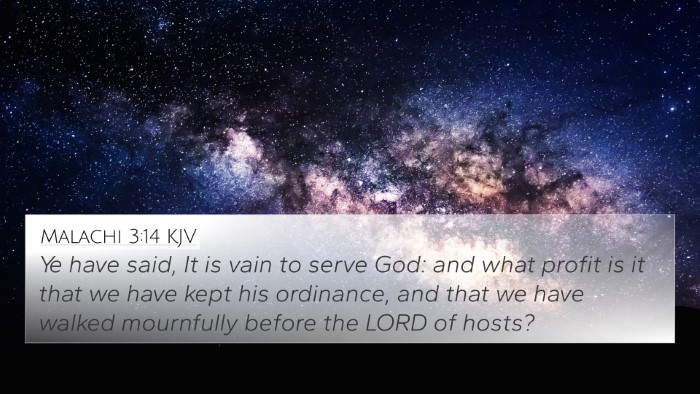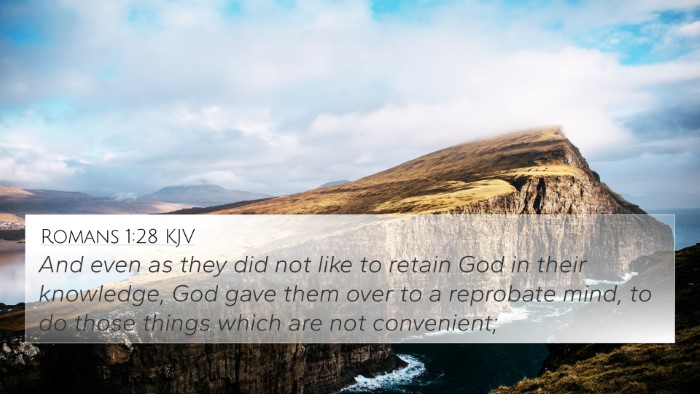Old Testament
Genesis Exodus Leviticus Numbers Deuteronomy Joshua Judges Ruth 1 Samuel 2 Samuel 1 Kings 2 Kings 1 Chronicles 2 Chronicles Ezra Nehemiah Esther Job Psalms Proverbs Ecclesiastes Song of Solomon Isaiah Jeremiah Lamentations Ezekiel Daniel Hosea Joel Amos Obadiah Jonah Micah Nahum Habakkuk Zephaniah Haggai Zechariah MalachiJob 22:17 Similar Verses
Job 22:17 Cross References
Which said unto God, Depart from us: and what can the Almighty do for them?
Uncover the Rich Themes and Topics of This Bible Verse
Listed below are the Bible themes associated with Job 22:17. We invite you to explore each theme to gain deeper insights into the Scriptures.
Job 22:17 Cross Reference Verses
This section features a detailed cross-reference designed to enrich your understanding of the Scriptures. Below, you will find carefully selected verses that echo the themes and teachings related to Job 22:17 KJV. Click on any image to explore detailed analyses of related Bible verses and uncover deeper theological insights.

Job 21:14 (KJV) »
Therefore they say unto God, Depart from us; for we desire not the knowledge of thy ways.

Psalms 4:6 (KJV) »
There be many that say, Who will shew us any good? LORD, lift thou up the light of thy countenance upon us.

Job 21:10 (KJV) »
Their bull gendereth, and faileth not; their cow calveth, and casteth not her calf.

Isaiah 30:11 (KJV) »
Get you out of the way, turn aside out of the path, cause the Holy One of Israel to cease from before us.

Malachi 3:14 (KJV) »
Ye have said, It is vain to serve God: and what profit is it that we have kept his ordinance, and that we have walked mournfully before the LORD of hosts?

Matthew 8:34 (KJV) »
And, behold, the whole city came out to meet Jesus: and when they saw him, they besought him that he would depart out of their coasts.

Matthew 8:29 (KJV) »
And, behold, they cried out, saying, What have we to do with thee, Jesus, thou Son of God? art thou come hither to torment us before the time?

Romans 1:28 (KJV) »
And even as they did not like to retain God in their knowledge, God gave them over to a reprobate mind, to do those things which are not convenient;
Job 22:17 Verse Analysis and Similar Verses
Understanding Job 22:17
Job 22:17 states: "Which said unto God, Depart from us: and what can the Almighty do for them?" This verse is part of a conversation where Eliphaz, one of Job's friends, responds to Job’s lamentations and suffering. It reflects both the theological misunderstandings present in the dialogue about God's nature and human sinfulness.
Summary of Interpretations
This verse encapsulates several profound meanings based on commentaries by Matthew Henry, Albert Barnes, and Adam Clarke:
- Rejection of Divine Authority: The phrase "Depart from us" denotes a profound misunderstanding of God’s role in human affairs. Eliphaz illustrates a perspective where rejecting God places one outside the scope of His help and mercy.
- Human Condition: This verse highlights the arrogance of humanity thinking they can thrive without divine intervention. It underscores the futility of separating oneself from the Almighty.
- Consequence of Sin: Eliphaz posits that such rejection leads to inevitable consequences, reflecting a belief that sin distorts one's relationship with God. He implies that sin invites suffering, a recurring theme throughout the book of Job.
- The Nature of God: The verse activates a discussion about the omnipotence of God. Eliphaz implies that disavowing God's presence limits His ability to act — a theological misconception.
- Judgment vs. Mercy: The commentaries elaborate on the balance between God’s judgment and His willingness to extend mercy, suggesting the need for a humble recognition of God’s sovereignty.
Bible Verse Cross-References
To deepen the understanding of Job 22:17, here are some relevant cross-references that illustrate thematic connections throughout the scripture:
- Psalm 14:1: "The fool has said in his heart, There is no God." This verse aligns with the concept of rejecting God’s authority.
- Isaiah 30:1-3: This passage discusses the folly of rebellious children who seek refuge apart from God, reflecting similar sentiments from Eliphaz.
- Proverbs 1:28-29: These verses highlight the consequences of forsaking wisdom and the rejection of God's guidance.
- Romans 1:21-22: This New Testament passage expands the idea of rejection of God leading to a darkened understanding, paralleling Job's context.
- John 15:5: Jesus’ declaration that apart from Him, we can do nothing, emphasizing reliance on divine assistance.
- Job 21:14: Job’s own expression of those who reject God while enjoying the world's pleasures, leading to similar conclusions as Eliphaz.
- Jeremiah 2:13: A commentary on forsaking the fountain of living waters, paralleling the rejection thematic in Job 22:17.
Comparative Bible Verse Analysis
The dialogue in the Book of Job is rich with themes of suffering, divine justice, and human misunderstanding. Eliphaz's assertion in Job 22:17 invites an analysis of:
- How human beings often misinterpret their suffering as a direct response from God rather than the complexity of life.
- The importance of discerning the true nature of God as merciful and just, contrary to the assumptions made by Eliphaz.
- The dialogue's relevance in contemporary discussions about faith, particularly the concept of God's presence in times of trouble.
Linking Bible Scriptures
Job 22:17 can be seen as part of a broader narrative linking different scripture passages about sin and repentance:
- Luke 12:16-21: The parable of the rich fool reflects the dangers of self-reliance without acknowledging God.
- Matthew 7:23: Those who claim to know God but live contrary to His will face separation from God, reminiscent of Eliphaz's view.
- Acts 3:19: The call to repentance suggests the restoration of relationship with God as opposed to rejection.
Thematic Bible Verse Connections
Delving into the interconnected themes present across the Bible surrounding Job 22:17 unveils:
- The consequences of sin: Throughout the New and Old Testaments, the relationship between divine lack of favor and rejection of God is made manifest.
- Human folly: The consistent narrative of humanity misunderstanding God and their own need for Him resonates through various scriptures.
Cross-Referencing Bible Study Methods
Tools for Bible cross-referencing can enrich the study of Job 22:17:
- Using a Bible concordance to find related themes and verses.
- Engaging in cross-reference Bible study by comparing similar passages side-by-side.
- Utilizing comprehensive Bible cross-reference materials for deeper insights into thematic connections.
Conclusion
In conclusion, Job 22:17 offers profound insights into the nature of human relationships with the divine. Reflecting on the commentary from respected scholars sheds light on the misinterpretations of God's justice and mercy. Through cross-referencing Bible texts, readers can uncover a richer understanding of the various themes interwoven throughout the scripture.


